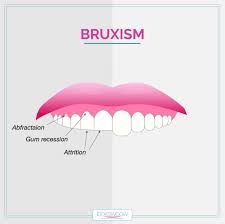Nocturnal Bruxism is the medical term used for clenching and/or grinding your teeth while you are asleep. An estimated eight percent of all adults grind their teeth, and up to a third of parents report that their children would occasionally grind their teeth at night also. Occasional grinding is not much of a problem, but when it happens regularly it can cause tooth pain, facial pain and disturb your sleep.
The Causes Nocturnal Bruxism
The exact causes of this disorder are not fully understood. Studies have linked nocturnal bruxism with anxiety and stress, as well as alcohol use, cigarettes, and caffeine. There have also been connections made to sleep apnea and snoring. Some medications can also contribute to nocturnal bruxism. Nocturnal Bruxism is not caused by psychological or psychiatric issues.
The Symptoms of Nocturnal Bruxism
If you have nocturnal bruxism, you may notice that your teeth feel sore or sensitive. Your dentist will notice wear or damage to your teeth. The wear pattern from bruxism is much different from the wear pattern that would be found from everyday chewing. The wear on your teeth from bruxism may be limited to only a few teeth or even to one side of your mouth. Wear from chewing is more evenly distributed. You may notice other symptoms as well, such as:
- Frequent headaches
- Earaches
- Pain in and around your jaw
- Facial pain
- Tooth pain.
Treating Nocturnal Bruxism
To treat the damage to your teeth from grinding, your dentist may be able to repair the enamel with a composite resin. If any fillings have been damaged, they will need to be replaced. To prevent further problems, your dentist may recommend a night guard. This dental appliance is a custom fit acrylic mouthguard that will fit over your teeth. This night guard can also reduce the strain on the muscles of your jaw and reduce your jaw and facial pain.
Nocturnal Bruxism and Sleep Disorders
Research shows that nocturnal bruxism could be your body’s effort to open restricted air flow while you sleep. If your dentist says you have nocturnal bruxism and you snore consistently, you may want to speak with your family doctor about a sleep study.Studies have linked nighttime jaw clenching and teeth grinding with sleep apnea. The grinding could be your body’s way of compensating for a sleep disorder. Treating the sleep disorder could reduce or eliminate the nocturnal grinding and clenching.
Based in Newcastle NSW, here at Morrin Dental we are dedicated to providing quality dental care for you and your entire family. Contact Morrin Dental for general, cosmetic and preventative dentistry.
